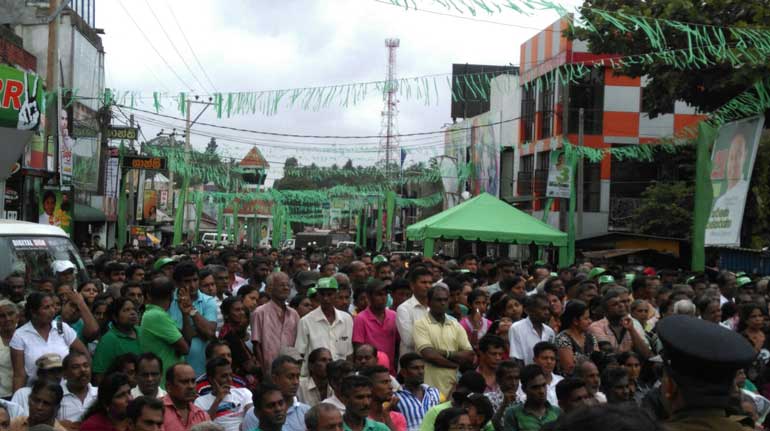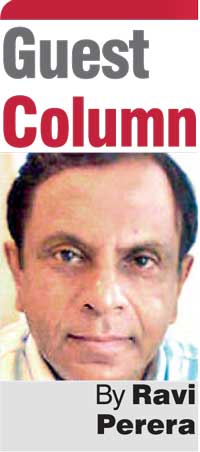Sunday Feb 15, 2026
Sunday Feb 15, 2026
Saturday, 15 August 2015 00:00 - - {{hitsCtrl.values.hits}}
 The mood around the political stage is frenetic; endless noise, blaring music, anxious organisers flurrying about, expectant crowds and finally the speakers addressing the “Dugee, Duppath and Ahinsaka” voter
The mood around the political stage is frenetic; endless noise, blaring music, anxious organisers flurrying about, expectant crowds and finally the speakers addressing the “Dugee, Duppath and Ahinsaka” voter
‘Men might rebel; but in the end they usually make their peace. There is no room in India for outsiders. The Arya Samaj, the Aryan Association, a reformist group opposed to traditional ideas of caste, and active in north India earlier in the century failed for a simple reason. It couldn’t meet the marriage needs of its members; India called them back to their castes and rules they had abjured. And five years ago in Delhi I heard this story. A foreign businessman saw that his untouchable servant was intelligent, and decided to give the young man an education. He did so, and before he left the country he placed the man in a better job. Some years later, the businessman returned to India. He found that his untouchable was a latrine-cleaner again. He had been boycotted by his clan for breaking away from them; he was barred from the evening smoking group. There was no other group he could join, no woman he could marry. His solitariness was insupportable, and he had returned to his duty, his dharma; he had learnt to obey’ – V.S. Naipaul, ‘A wounded civilisation’.
One of the less pleasurable aspects of the election campaign for us surely is to be described by the eloquent politicians as “abjectly poor, bedraggled and innocent”. “Dugee”, “Duppath” and “Ahinsaka” are the words that spring to their minds when they behold us.
The term “Third World” originally coined by a French demographer, was used in general terms to describe countries which were considered under-developed and relatively poor in comparison to the First and Second World. This was when the world was polarised ideologically between the West allied with the USA and the Soviet bloc led by USSR. Such a reference is not acceptable to the more politically correct consciousness of today. ‘Developing’ or ‘rapidly advancing’ are some of the ways in which countries such as Sri Lanka are referred to now.
If a politician were to refer to the average voter as either “going to be rich soon” or “rapidly advancing”, I am not certain whether that would necessarily win him more votes. For one, given the realities of their lives, very few of them will think such a description would be justified. Leave alone rapidly advancing, they will be happy if they can maintain their present standard of life, difficult as it may be.
From the manner in which the description “Dugee, Duppath and Ahinsaka” is used, it is clear that the politicians on stage do not consider themselves to be in that category. There is a certain pitying in the words which excludes the user. Besides, what point is there in voting for a person who is in the same plight as the audience! Of course, in meaning, Dugee, Duppath and Ahinsaka go far beyond the size of the voter’s purse. It is an all-encompassing definition of a person; his outlook, assessment, ideas, actions, reactions, solutions to his problems – in fact all aspects of his personality.
The mood around the political stage is frenetic; endless noise, blaring music, anxious organisers flurrying about, expectant crowds and finally the speakers addressing the “Dugee, Duppath and Ahinsaka” voter. They arrive there in convoys of the sleekest vehicles available in the country. They alight from the vehicles surrounded by a cordon of security men and make their way to the stage amidst loud cheers from the crowd. There they sit, totally at ease in the public eye, chatting amiably with fellow politicians on stage.
In their speeches, the language is more formal, not the everyday language of the “Dugee, Duppath and Ahinsaka”. The speeches are lengthy, spicy; apparently the other side is evil, corrupt and untrustworthy. If the message is to be described in one word it is “righteousness”; they and they alone represent the “good”. There are no doubters; this is no place for scepticism.
Statistically Sri Lanka is now not among the poorest countries in the world, as we were some years back. According to some analysts we now belong to the category of lower-middle income countries. As pointed out by the economists, disparities in wealth distribution in a given society make such classifications a doubtful definition, except as a general reference. However for those with a memory of the 1960s and ’70s, it is obvious that the kind widespread poverty we had then does not exist now.
With the opening up of the economy in the late 1970s there was greater scope for financial advancement. It is also in this period that large scale economic migration, mainly to the Middle East, began. On the basis of many social indicators the average life standard of a Sri Lankan compares well against many of the poor nations.
But there is another poverty; real, undeniable, running through the entire social fabric. The politician making a career out of politics, the businessman who owes his success not to his innovations and competiveness but to his bribes and commissions, the bureaucrat who defines his functions not in the terms of service he performs but the degree of servility to the political boss, the policeman who is more a threat to the law than its guardian, the priest whose spirituality is announced by his popularity and not his devotion and denials, the judge who judges his(and his friends) own cause, the employee stealing steadily from his employer are in a way more abject than those poor in money terms. The latter could be addressed.
The idea of representative form of government evolved in climes and cultures very different and only came to us as a part of the constitutional reforms introduced during the colonial period. Any constitutional changes or developments thereafter appear to be more gerrymandering than genuine reforms, motivated mainly by personal or group interests. Laws, gazettes, even constitutions are amended to suit personal interests. When it comes to voting, from fixing the date of the elections, social benefits from the government, jobs in the public sector, drawing of electoral boundaries to even appointing officers in charge of police stations are undertaken with a view of influencing the outcome.
They are once again wooing the “Dugee, Duppath and Ahinsaka”. That very definition is diminishing, humbling, deserving of charity. The idea of an election has been made purely economic; a vote buying exercise, indulged by the “other” .It is not an exercise of a fundamental democratic right by a strong and intelligent electorate but a pathetic reach for crumbs at a feast enjoyed by the elected.
Even the main actors, the politicians perhaps do not fully comprehend extent of the tragedy. Both the feast and the crumbs rightfully belong to the voter. It is only the management thereof which is entrusted to the politician. Having run the country down now they are offering crumbs in order to rule for even longer. As famously observed they are auctioning assets they do not even have!
The untouchable in the Naipaul story surrendered to his description, to rebel was to choose a lonely life of uncertain fate. A Dugee, Duppath and Ahinsaka cannot really make a choice. The temptation to accept the best bid is overwhelming. By defining him in that way, the politician denies him his freedom.
Will the voter obey the dictates of his definition, or rebel?